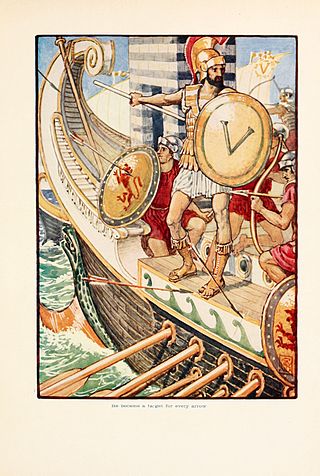
Amphipolis was an important ancient Greek polis (city), and later a Roman city, whose large remains can still be seen. It gave its name to the modern municipality of Amfipoli, in the Serres regional unit of northern Greece.

The Peloponnesian War was an ancient Greek war fought between Athens and Sparta and their respective allies for the hegemony of the Greek world. The war remained undecided for a long time, until the decisive intervention of the Persian Empire in support of Sparta. Led by Lysander, the Spartan fleet, built with Persian subsidies, finally defeated Athens and started a period of Spartan hegemony over Greece.

The 5th century BC started the first day of 500 BC and ended the last day of 401 BC.
Year 431 BC was a year of the pre-Julian Roman calendar. At the time, to Romans it was known as the Year of the Consulship of Cincinnatus and Mento. The denomination 431 BC for this year has been used since the early medieval period, when the Anno Domini calendar era became the prevalent method in Europe for naming years.
This article concerns the period 429 BC – 420 BC.
Year 429 BC was a year of the pre-Julian Roman calendar. At the time, it was known as the Year of the Consulship of Tricipitinus and Fidenas. The denomination 429 BC for this year has been used since the early medieval period, when the Anno Domini calendar era became the prevalent method in Europe for naming years.
Year 424 BC was a year of the pre-Julian Roman calendar. At the time, it was known as the Year of the Tribunate of Crassus, Fidenas, Rutilus and Iullus. The denomination 424 BC for this year has been used since the early medieval period when the Anno Domini calendar era became the prevalent method in Europe for naming years.
Year 425 BC was a year of the pre-Julian Roman calendar. At the time, it was known as the Year of the Tribunate of Atratinus, Medullinus, Cincinnatus and Barbatus. The denomination 425 BC for this year has been used since the early medieval period, when the Anno Domini calendar era became the prevalent method in Europe for naming years.

The Peace of Nicias was a peace treaty signed between the Greek city-states of Athens and Sparta in March 421 BC that ended the first half of the Peloponnesian War.

Nicias was an Athenian politician and general during the period of the Peloponnesian War. Nicias was a member of the Athenian aristocracy and had inherited a large fortune from his father, which was invested in the silver mines around Attica's Mt. Laurium. Following the death of Pericles in 429 BC, he became the principal rival of Cleon and the democrats in the struggle for the political leadership of the Athenian state. He was a moderate in his political views and opposed the aggressive imperialism of the democrats. His principal aim was to conclude a peace with Sparta as soon as it could be obtained on terms favourable to Athens.
Cleon was an Athenian general during the Peloponnesian War. He was an early representative of the commercial class in Athenian politics; which during the early Peloponnesian war was coming into prominence - although he was an aristocrat himself. He strongly advocated for an offensive war strategy and is remembered for being ruthless in carrying out his policies. He was often depicted in a negative way, predominantly by Thucydides and the comedic playwright Aristophanes, who both represent him as an unscrupulous, warmongering demagogue. Cleon was the son of Cleaenetus.

Brasidas was the most distinguished Spartan officer during the first decade of the Peloponnesian War. He died during the Second Battle of Amphipolis while winning one of his most spectacular victories.

The History of the Peloponnesian War is a historical account of the Peloponnesian War, which was fought between the Peloponnesian League and the Delian League. It was written by Thucydides, an Athenian historian who also served as an Athenian general during the war. His account of the conflict is widely considered to be a classic and regarded as one of the earliest scholarly works of history. The History is divided into eight books.

The Battle of Amphipolis was fought in 422 BC during the Peloponnesian War between Athens and Sparta. It was the culmination of events that began in 424 BC with the capture of Amphipolis by the Spartans.

Demosthenes, son of Alcisthenes, was an Athenian general during the Peloponnesian War.

Peace is an Athenian Old Comedy written and produced by the Greek playwright Aristophanes. It won second prize at the City Dionysia where it was staged just a few days before the validation of Peace of Nicias, which promised to end the ten-year-old Peloponnesian War, in 421 BC. The play is notable for its joyous anticipation of peace and for its celebration of a return to an idyllic life in the countryside. However, it also sounds a note of caution, there is bitterness in the acknowledgment of lost opportunities, and the ending is not happy for everyone. As in all of Aristophanes' plays, the jokes are numerous, the action is wildly absurd and the satire is savage. Cleon, the pro-war populist leader of Athens, is once again a target for the author's wit, even though he had died in the Battle of Amphipolis just a few months earlier.

The Edoni were a Thracian people who dwelt mostly between the Nestus and the Strymon rivers in southern Thrace, but also once dwelt west of the Strymon at least as far as the Axios. They inhabited the region of Mygdonia before the Macedonians drove them out. After that, they settled in the region of Edonis which was named after them. There were a number of Edonian cities in the Classical era, including Drabeskos and Myrkinos.
The Battle of Megara was fought in 424 BC between Athens and Megara, an ally of Sparta. Whilst the Athenian forces were initially successful against the Peloponnesian garrison there, a hasty arrival of Spartan forces under Brasidas saw a stalemate and eventual victory of the oligarchic party within the city of Megara and the withdrawal of Athenian forces.
Hagnon, son of Nikias was an Athenian general and statesman. In 437/6 BC, he led the settlers who founded the city of Amphipolis in Thrace; in the Peloponnesian War, he served as an Athenian general on several occasions, and was one of the signers of the Peace of Nicias and the alliance between Athens and Sparta. In 411 BC, during the oligarchic coup, he supported the oligarchy and was one of the ten commissioners (probouloi) appointed to draw up a new constitution.
The Battle of Lyncestis/Lyncus took place in 423 BC between the allied forces of the Lyncestians and Illyrians against those of the Spartans and Macedonians. The battle was part of the wider Peloponnesian Wars. Before Athens suffered defeat at Delium in 424 BC, Sparta had sent an expedition under Brasidas to assist Perdiccas II of Macedonia and other opponents of Athens. At first Sparta avoided involvement in Macedon's war with Arrhabaeus, but in 423 BC they joined an expedition which ended with retreat by the Macedonians and a brilliantly contrived escape of the Spartans.










